If you are considering expanding into the Latin American region, engaging a professional employer organization in Colombia can be very advantageous. This option for market entry allows you to set up and get going as soon as you have identified the staff you would like to hire. The country is an ideal destination for seeking talent in many sectors, as it has a large and highly-educated services industry.
Throughout the country and the biggest cities, Colombia boasts a growing pool of IT and other skilled technicians. This has made outsourcing in Bogota a popular option, while Medellin has been named as one of Latin America’s most innovative cities due to its burgeoning start-up scene. Using a professional employer organization in Colombia can help you find exceptional talent throughout the country.
However, even though the country is known to be business and investment friendly, meaning it is more straightforward to incorporate a company in Colombia than in some other parts of Latin America, entering the market and doing business in the country still comes with hurdles for newcomers.
For that reason, hiring via a professional employer organization in Colombia can be particularly attractive, because the PEO firm will be staffed by experienced professionals, able to identify and avoid common regulatory pitfalls, as well as provide access to an established recruitment network with a strong track record of hiring the best talent.
Why should I invest in Colombia?
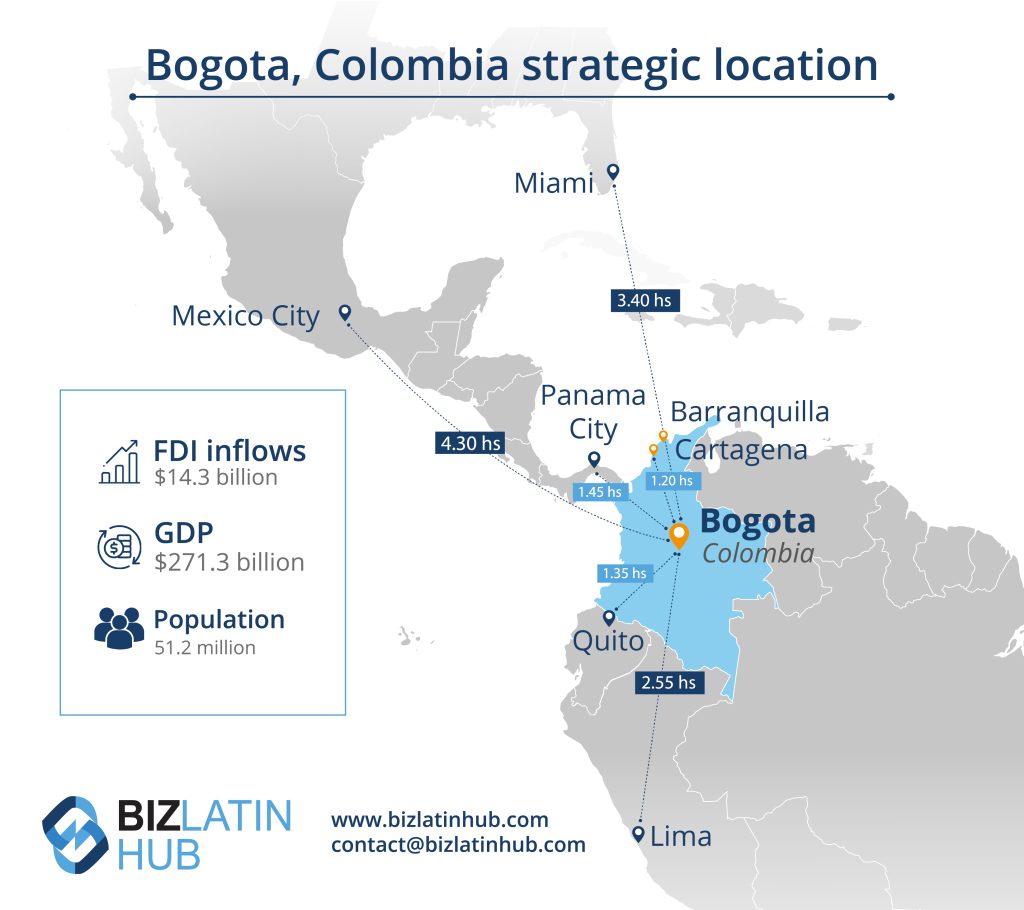
The economy has been growing consistently over the years. In 2022, despite the challenges posed by the COVID-19 pandemic, GDP grew by 7.3%. Colombia ranked 67th out of 190 countries in the World Bank’s Ease of Doing Business Index 2020.
The country has free trade agreements with multiple countries, including the United States, Canada, and the European Union. Forming a company in a country with free trade agreements offers many benefits, and a knowledgeable professional employer organization in Colombia can help you take advantage of them.
In addition, Colombia boasts a well-educated and skilled workforce. The country has over 600 universities and technical institutions, producing a pool of talented professionals.
Colombia is recognized for its strong engineering programs and has a growing number of graduates in technology-related fields. Hiring through a professional employer organization in Colombia can help your company hire from this highly skilled talent pool.
The country is an attractive location for business opportunities, investment, skilled workforce, infrastructure development, tourism, and a safer operating environment. To take advantage of these opportunities, it is beneficial to work with a reliable professional employer organization in Colombia.
What is a professional employer organization in Colombia?
A professional employer organization in Colombia is often referred to as a PEO or as an employer of record (EOR), while providers will sometimes advertise themselves as a PEO payroll company, as this is one of the most sought after services they offer.
A professional employer organization will take care of a range of employee-related concerns, including drawing up contracts in accordance with the law, honoring all statutory leave allowances, paying salaries and bonuses correctly, and complying with all tax-related matters.
When you hire through a PEO firm in Colombia, not only do you tap into the local knowledge and contacts that the PEO firm has, while also removing a major administrative and compliance issue, but you also avoid the need to go through company formation and subsequent liquidation.
That is a particularly attractive prospect for anyone seeking to hire an individual or small number of senior staff to manage operations, direct regional sales, or undertake other executive duties. It is also ideal for anyone who is seeking support on a short-term or limited-scale basis — for example hiring a team of software developers to deliver a particular project.
The legal framework governing EORs in Colombia is governed by the Labor Code, which outlines the employer-employee relationship and the obligations of employers. The Colombian government has established additional regulations that EORs must comply with, including tax and social security requirements.
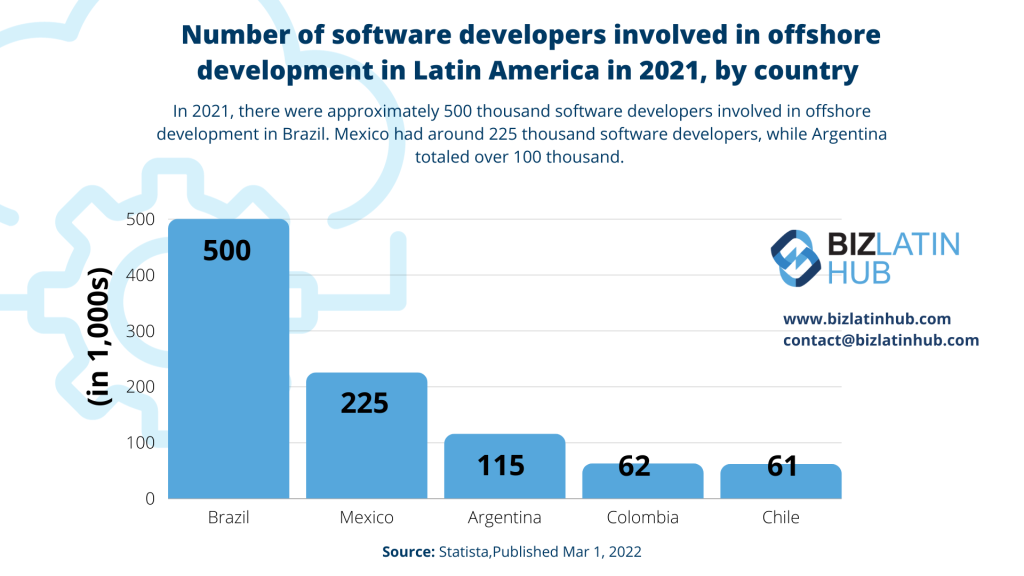
Why hire through an EOR in Colombia?
There are many advantages to working with a professional employer organization in Colombia. Hiring through an EOR in Colombia allows foreign companies to operate without the need to establish a local entity. This is particularly beneficial for companies looking to test the market before committing to a full-scale expansion.
Without the delays associated with establishing a local entity, companies can quickly hire employees and begin operations. In this way, using an EOR can help companies accelerate their time-to-market. Moreover, when the time comes for you to close operations in Colombia, your market exit will be completed in only the time it takes for staff hired via a PEO firm to serve their statutory notice period.
Another advantage of working with a professional employer organization in Colombia is the immense network that is already established for recruitment including the knowledge of the best educational institutions and local companies that ideal candidates may have experience with. Hiring through an EOR in Colombia allows companies to access a wider pool of talent across the country.
Moreover, the EOR can handle the complexities of employment law across different regions, and allow a company to hire in multiple jurisdictions, making it easier for them to expand their operations. EORs in Colombia offer a high level of flexibility in terms of employment arrangements. They can handle short-term or project-based contracts, part-time, and provide support for employees across multiple jurisdictions.
In addition, EORs in Colombia have a deep understanding of the local employment market, labor laws, and cultural norms. This expertise can be invaluable for companies looking to navigate the complexities of doing business in the country. Working with a professional employer organization in Colombia will guarantee that you avoid legal inconveniences and financial penalties for non-compliance.
Finally, EORs in Colombia handle all aspects of HR administration, including payroll, benefits, taxes, and compliance. This can significantly reduce the administrative burden on the company, freeing up time and resources to focus on core business operations.
What does a professional employer organization in Colombia do?
A professional employer organization in Colombia will take care of the regulatory and compliance concerns that are related to having employees in the country. They will also inform you if changes to the relevant regulations are due to occur; These are some of the labor regulations a PEO in Colombia takes care of:
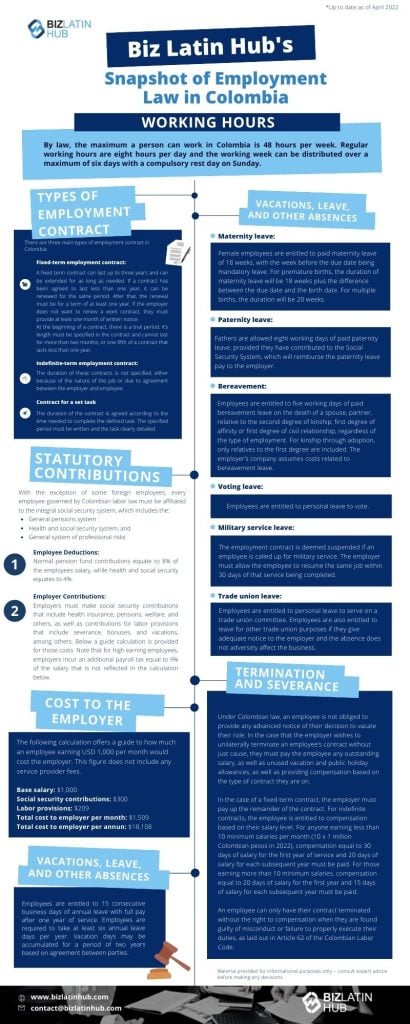
- Working hours: Colombia has a standard working week of 48 hours long, generally made up of six days lasting eight hours each.
- Overtime: Employees mustn’t work more than two hours of overtime per day. Your professional employer organization in Colombia will make sure compliance is a top priority, including overtime restrictions and wage duties.
- Paid vacations: After 12 months of employment, an employee is entitled to 15 consecutive days of paid leave, of which they must take at least six days during the following 12 months.
- Bonuses: Colombia, like many Latin American countries, has a ‘13th salary’ bonus that employees are entitled to — consisting of a full month’s salary, usually paid in two installments in the middle of the year and at the end of the year. A reliable professional employer organization in Colombia will fully understand these matters and have them handled timely.
- Parenthood leave: Mothers are entitled to 18 weeks of maternity leave, which can be extended to 20 weeks, and by law must start at least a week before the due date of the birth, while fathers are allowed eight days of paternity leave.
- Voting leave: In Colombia, employees are entitled to half a day of personal leave to vote in local and national elections, should they fall on a work day.
- Trade union leave: Employees are entitled to personal leave in order to serve on a trade union committee.
- Minimum wage: As of January 2024, the minimum wage was set at COP$1.3million per month (approximately USD$340). If minimum wage fluctuates, a quality professional employer organization in Colombia will be able to adapt the company to meet compliance standards.
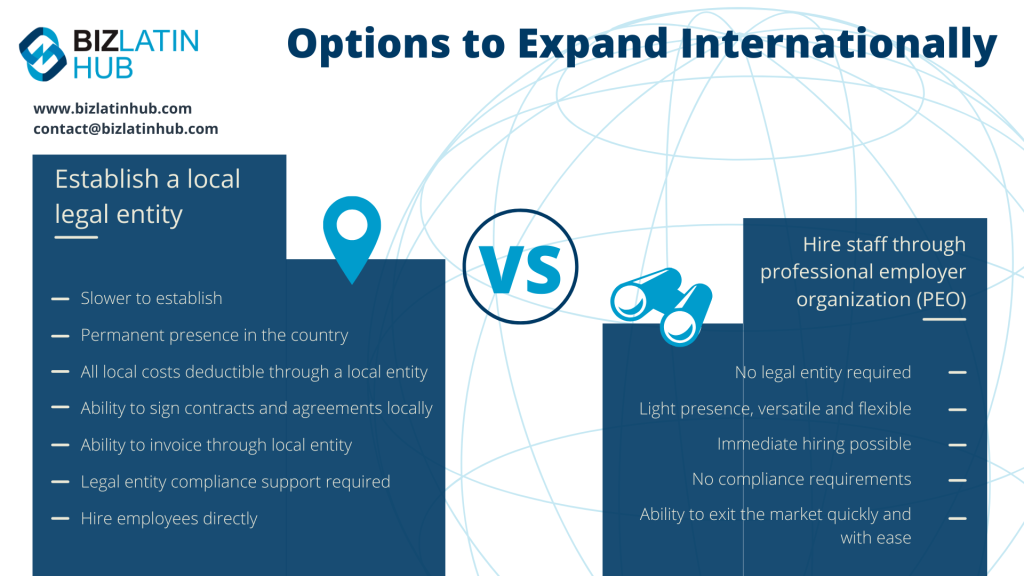
How to use a payroll calculator for a professional employer organization in Colombia
If you want to get an idea of the possible costs involved with a professional employer organization in Colombia, using a payroll calculator is one way to get a good estimate.
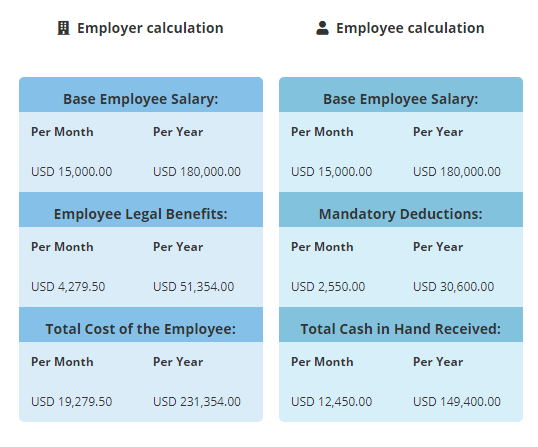
A payroll calculator will give you the opportunity to look at costs while varying the salary, the number of employees, the country you want to enter, and the currency you wish to work in. As such, you will be able to understand your likely costs across a range of salaries, while also being able to compare other countries as potential alternative destinations.
You can find the BLH payroll calculator at the bottom of our Hiring & PEO Services page. The calculator will allow you to make good estimations of the costs involved in hiring in Latin America and the Caribbean based on country, currency, and salary, with the calculator factoring in local statutory deductions.
To use the BLH payroll calculator, you will need to undertake the following steps:
Step 1: Select the country
Choose the country where you are doing business, or planning to launch. This feature will be useful when it comes to comparing potential alternative markets.
Step 2: Select the currency you wish to deal in
You can choose between US dollars (USD), British Sterling (GBP) and Euros, as well as the local currency for the country you are looking at, compared to what is most convenient for you. Note that for Ecuador, El Salvador, and Panama, the local currency is also USD, as they have dollarized economies.
Step 3: Indicate an employees monthly income
Here you can indicate the expected salary you will be paying an employee, in the currency of your choice.
Step 4: Calculate your estimated costs
Based on all of the information you have provided, you will receive results indicating your estimated costs, including a breakdown for estimated statutory benefits you will be liable for.
Step 5: Compare your costs to other options
With a good estimate at hand of how much your staff in Colombia would be, if you are flexible about your expansion into Latin America and the Caribbean, you can use the BLH payroll calculator to compare those costs to other jurisdictions.
FAQs on hiring through a professional employer organization in Colombia
Based on our extensive experience, these are the common questions and doubts of our clients on hiring through an EOR in Colombia:
1. How does one hire employees in Colombia?
You can hire an employee by incorporating your own legal entity in Colombia, and then using your own entity to hire employees or you can hire through an Employer of Record (EOR), which is a third party organization that allows you to hire employees in Colombia by acting as the legal employer. Meaning you do not need a Colombian legal entity to hire local employees.
2. What is in a standard employment contract in Colombia?
A standard Colombian employment contract should be written in Spanish (and can also be in English) and contain the following information:
- ID and address of the employer and employee
- City and date
- The location where the service will be provided.
- Type of tasks to be carried out
- Remuneration and bonifications/commissions (if applicable)
- Method payment frequency
- Duration of the contract.
- Probation period
- Work hours
- Additional benefits (if applicable)
3. What are the mandatory employment benefits in Colombia?
The mandatory employment benefits in Colombia are the following:
- Working tools necessary to carry out the work (if applicable)
- Payment of social security contributions (health, pension, and labor risks).
- Social benefits (service premium, severance pay, and interest on severance pay).
- Paid time off (vacation and Sunday rest).
- Disabilities (common or labor origin).
- Transportation allowance (if applicable)
- Overtime and surcharges (if applicable)
4. What is the total cost for an employer to hire an employee in Colombia?
The total cost for an employer to hire an employee varies based on the salary structure, as in Colombia there are two types of salary structure. These are ordinary salary (salario ordinario) and integrated salary (salario integral). The total cost to the employer for mandatory employment benefits via an ordinary salary is between 40% and 55% and via an integrated salary is between 20% and 35% and is additional to the employee’s gross salary.
Please use our Payroll Calculator to calculate employment cost.
5. What is the difference between hiring through an EOR and forming a legal entity?
The best decision depends on the needs of your company. Forming a legal entity has the following characteristics:
- Slower to establish.
- Permanent presence in the country.
- All costs deductible through a local entity.
- Ability to sign contracts and agreements locally.
- Ability to invoice through local entity.
- Legal entity compliance support required.
- Hire employees directly.
6. What is the difference between a PEO and an EOR?
A PEO works with your company as a co-employer, while a EOR is the legal employer of your employees. An EOR can provide more services than a PEO.
Biz Latin Hub can be your professional employer organization in Colombia
At Biz Latin Hub, we provide integrated market entry and back-office services throughout Latin America and the Caribbean, with offices in 17 key cities around the region, including Brazil’s economic hub Sao Paulo.
Our portfolio includes accounting & taxation, company formation, due diligence, hiring & PEO, and corporate legal services, while our unrivaled regional presence means we are ideally placed to support multi-jurisdiction market entries and cross-border operations. If you need a PEO firm in Colombia, we are ready to help.
Contact us today to find out more about how we can assist you.
If you found this article on hiring through a professional employer organization in Colombia of interest, you may want to check out the rest of our coverage of this South American country. Or read about our team and expert authors.






